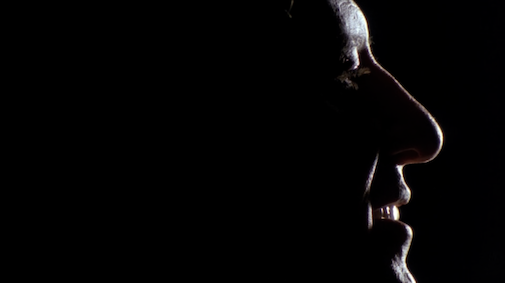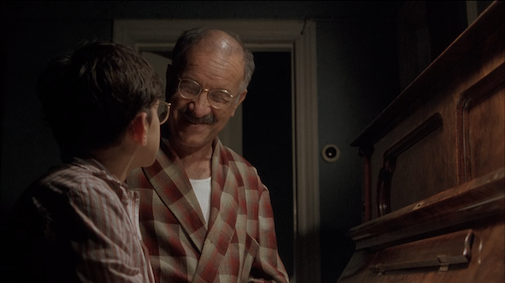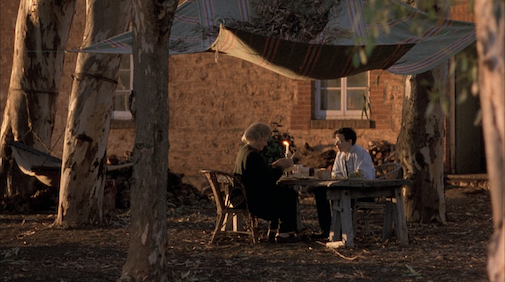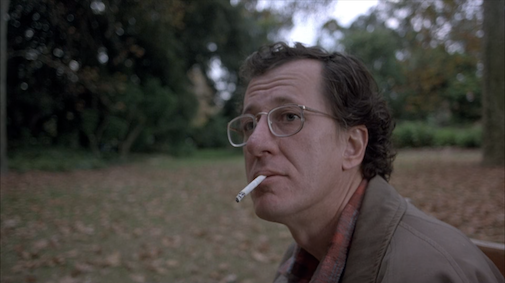by Nick Taylor

One of my favorite bits of This Had Oscar Buzz’s year in review episodes is the segments where they discuss a film that overcame its middling quality to cash in on their buzz and score with the Academy. This is the energy I bring to you for my 25th anniversary retrospective of Shine, an Australian film that copped seven Oscar nominations and a Best Actor prize for Geoffrey Rush in his starmaking role. I do not remember hearing or reading a single solitary comment about this film in the years since I became a cinephile. The closest I’ve ever gotten comes courtesy of folks sticking up for their personal pet among 1996’s Best Actor lineup, or scattered comments that Geoffrey Rush was better in his other nominated performances. It’s slim pickings, and having finally seen Shine for myself, I find very little of worth to really excavate here. Who’s to say how much the Artist Biopic has fundamentally changed from one decade to the next?
Our protagonist is David Helfgott (played by Alex Rafalowicz as a child, Noah Taylor as a teenager, and Geoffrey Rush as an adult), an Australian pianist who became famous in his youth and was institutionalized for years in his adulthood following a breakdown at a college recital...
Shine begins in extreme close-up on an adult David in profile, lit so only the outline of his face is visible as he rambles on about something or other at a mile a minute. He patters around on a rainy evening and nudging his way into a recently closed restaurant. A quartet of employees try to wave him off only to realize he needs attending to, and the one woman of the group takes it upon herself to get him home. We then cut to David’s youth, where his excellent performance at a recital and special distinction prize can’t reconcile his father Peter (Armin Muehler-Stahl) with the fact that the boy didn’t get first place, and is therefore a loser bitch. Peter has been teaching his son how to play piano his whole life, instilling in him the sense that he should be lucky to learn music in a warm home when his own father cruelly denied him those things, and we quickly recognize the man as a gentle terror. One of the judges stops by the Helfgott’s home and offers to give David private lessons, which his father initially bristles against but eventually allows.

Shine sporadically feints at presenting David’s adult and childhood selves on parallel tracks, but this device is only maintained for two scenes before just showing us his life in sequence. Once the bit about David’s childhood has ended, we see his Geoffrey Rush self get taken home from the restaurant that same evening, and as soon as he’s safely tucked in bed the film shoots to his young adulthood, with Noah Taylor taking the reins of the film for a good 45 minutes, with only one further interruption from Rush. David has grown up to be a tremendously awkward teenager playing at concerts and competitions. He eventually becomes a doted-on friend of Katharine Susannah Pritchard (Googie Withers), a co-founding member of Australia’s Communist Party whose political history is never once explored in the film. Peter has kept up his warm, domineering demeanor, and is now denying him permission to leave Australia for more prestigious opportunities abroad.
What persists through each chapter of David’s life is the profoundly superficial sense of engagement from Scott Hicks’s direction and writing. It’d be one thing if the script solely traded on cliches (which it absolutely does), but Hicks’s direction barely dives beyond the shallow outlines of his own script. Some craft aspects show well - David’s mid-film concert is the most we ever get in his headspace via film craft - but the uniform proficiency adds to the impression that Shine’s lack of POV bleeds is as much an aesthetic strategy as it is a narrative choice. Where the hell were all these craft nominations for Breaking the Waves or Portrait of a Lady? I’m not asking for the structural daring or formal elegance of Pain and Glory, but even by the standards of conventional biopicking, the handful of emotional high points and memorable images aren’t worth the dull sense of skating the surface of a fairly interesting life.

The most damning takeaway is that Shine never suggests any sense of David’s interest in music independent of any outside influence. Does he actually care about the piano? Do his loved ones and caregivers only see value in him based on his artistic skills, or in how David’s talents reflect on their skills as a parent, a teacher, or a lover? Does he only see value in himself based on his artistic skills? Shine tells us none of this, and it hamstrings David’s interpreters from sharing their own thoughts on the matter, whatever their efforts to highlight how such a sheltered, decent, talented, fundamentally helpless personality might navigate the world they’re living in. Taylor does a better job of playing this big ball of nerves, while Rush’s acting seems to have started and ended with the vocal and physical tics David accumulated after years in a psych ward. Also, did Rush seem like an odd continuity choice with Taylor to anyone else? One has to ask what Hugo Weaving was up to at the time. I wonder if Taylor and Rush are adding nuances that Hicks’s camera simply isn’t picking up, but it’s still maddening that we learn so little about the man this movie is literally built to showcase. He’s not so much a person or even an enigma as an empty vessel, nattering on and ready to do whatever anyone asks of him.
Armin Muehler-Stahl quite easily walks away with the whole thing, conveying a tender, even affectionate father who genuinely cannot recognize how he’s become as monstrous to his own family as his father was to him. I don’t believe he’d recognize his behavior as wrong or cruel, even if he recognizes the cruelties done to himself and others, and he makes the man’s tyranny all the more convincing for it. Lynn Redgrave is also quite moving in the last section of the film, though it’s funny that Hicks cordons off his “power of true love overcomes mental illness” portion of the film to its last 20 minutes.

I don’t know, honestly. Have I said enough about a movie I’ve reduced as hopelessly superficial?
Did this not have the kind of legs that could hold it up for 25 years, or am I right to ask why this had heat in the first place? Would you, dear reader, have a defense for this, or would you rather just list off some other favorites from 1996? It was a very good year for movies, you know. Shine just isn't part of that immortal crop.